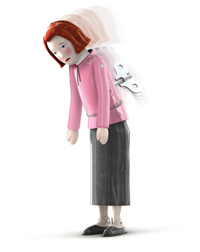Wyeth is cranking up consumer advertising for Pristiq with spots that aim to capture depression sufferers’ struggle to get through the day.
TV and print ads by JWT, which broke this week, feature wind-up dolls reflective of the insight that patients with depression often feel they’re “on autopilot” or “treading water” as they cope with feelings of sadness, trouble concentrating and listlessness.
“It came up again and again in talking to hundreds of patients,” said Andreas Eggert, VP and global business manager for Pristiq, “the idea of winding yourself up to get out of bed, and then winding yourself up again to get through the day. It resonated with patients, even if they didn’t use it in their description of the disease, they could relate to it and would say, ‘Yeah, that’s exactly how I feel.’”
TV ads feature a middle-aged woman toying with a wind-up likeness of herself and describing her daily battle with depression, “a serious medical condition that can take so much out of you.” About half of the 75-second spot is taken up by risk information for the drug, which carries a black-box warning for the risk of suicidality. Women make up around 70% of depression patients, and middle-aged women are particularly prone to the condition.
“Typically, it’s a woman that has a job, has family, and she gets stuff done, but it’s a constant struggle,” said Eggert. The ads are aimed particularly at patients who don’t seek treatment or who have given up on treatment. “They say, ‘Maybe I need to accept the way it is.’ We want to motivate them to talk to their physician and not give up, and facilitate that dialogue.”
The use of the wind-up doll gives Pristiq a memorable visual icon “that we can develop across different media and over time,” said Eggert.
Approved for the treatment of major depressive disorder in adults, Pristiq launched into the jam-packed category in May 2008. The brand faces a slew of branded competitors as well as generics, which make up almost two-thirds of US prescriptions for the disease. Wyeth sees the high rate of patient churn in the category as evidence of unmet need.
“Obviously, it’s not a silver bullet, but it is an advancement in therapy,” says Eggert. “What’s important is that people still don’t get medication that gets them to where they need to be in getting their symptoms under control, so the medical need is enormous.”
Professional ads, by Euro RSCG Life Chelsea, play up the drug’s tolerability and simplicity of dosing, which Wyeth says is an improvement on earlier SNRIs like its own Effexor and Lilly’s Cymbalta. The tagline for the journal ads is “Think beyond start.”
In addition to TV ads running in prime time and magazine ads appearing in Newsweek, Wyeth is running banner ads and weighing other digital efforts, though the drug’s black-box warning is limiting. Razorfish handles digital advertising on the brand.








